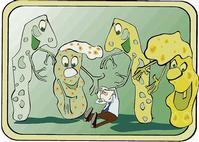
Eulalee Thompson
Germs personified are menacing little creatures. We can't see them (micro-organisms such as bacteria, viruses, fungi and protozoa) but the experts say that they are just about everywhere - at home, at the office, in food, water, soil, air, on your pet dogs and cats and even on your body.
Even surfaces that appear clean could have these little micro-organisms waiting to launch an attack on a suitable host.
So, by now most people should be at least borderline obsessive-compulsive and anxiously following detailed cleaning rituals. It's an anxiety fuelled by aggressive marketing in the cleaning industry. The novice could spend a whole afternoon in the supermarket's cleaning and detergent aisle. There are cleaners that disinfect and deodorise, but some of them only clean and maybe deodorise. Then there are cleaners for the kitchen counter, another set for the toilet seat and yet another set to disinfect the toilet bowl. Then there are sprays to zap away germs on the sofa, and another spray to not only deodorise but neutralise germs in the air.
Do we really need to be so anxious about germs? 'No', would have been a welcomed response, but, unfortunately, one public health expert, Henroy Scarlett,
says 'yes'.
Scary kitchens
"We need to worry about germs but we tend to overdo it because of ignorance," said Mr. Scarlett, lecturer in environmental health, University of the West Indies' Department of Community Health and Psychiatry.
He said for instance that in the typical household most germs are in the kitchen and not in the bathroom. The kitchen is where food is prepared and utensils can be contaminated or cross-contaminated.
" For example, if the cutting board is not sanitised before using again (for another food preparation) ... you could have cross-contamination and food not stored properly can create the situation for foodborne diseases. So, the kitchen contains more organisms that could make people sick," Mr. Scarlett said.
Public toilets

But what about the toilet seat, worst yet, the toilet seat in public restrooms? Surely, those must be locations for 'germs parties'. Well ... maybe not.
"It is highly improbably that one will get germs when using public toilets, most people don't sit on the toilet seats anyway. So, unless it is obviously messy, it is unlikely that one would get
germs just by sitting on the seat," said Mr. Scarlett.
However, the possibility of 'catching something' from toilet seats does exist (and increases) if you have a break in your skin and there are organisms (maybe from syphilis or gonorrhoea) present on the seat or if there are particular parasites on the seat that could infect the pubic zone. These were unlikely but possible situations, Mr. Scarlett stressed.
"In the bathroom, it is obvious that there is going to be germs, but we tend to clean the bathroom more than any other room, so a typical toilet seat has less germs than a public telephone or a computer keyboard and mouse," said Mr. Scarlett. "Most of the germs are in the bowl because of the waste product and it is not going to stay there (if it is flushed)."
Interestingly, he said that typically, the bathroom floor has more germs than the toilet seat and what 'germ phobics' need to fear is not so much where the buttocks land, but what the hands touch.
"People need to wash their hands thoroughly and sometimes hands are properly washed but recontaminated by the drying method (such as dirty towels used)," Mr. Scarlett said.
Send comments to eulalee.thompson@gleanerjm.com.

